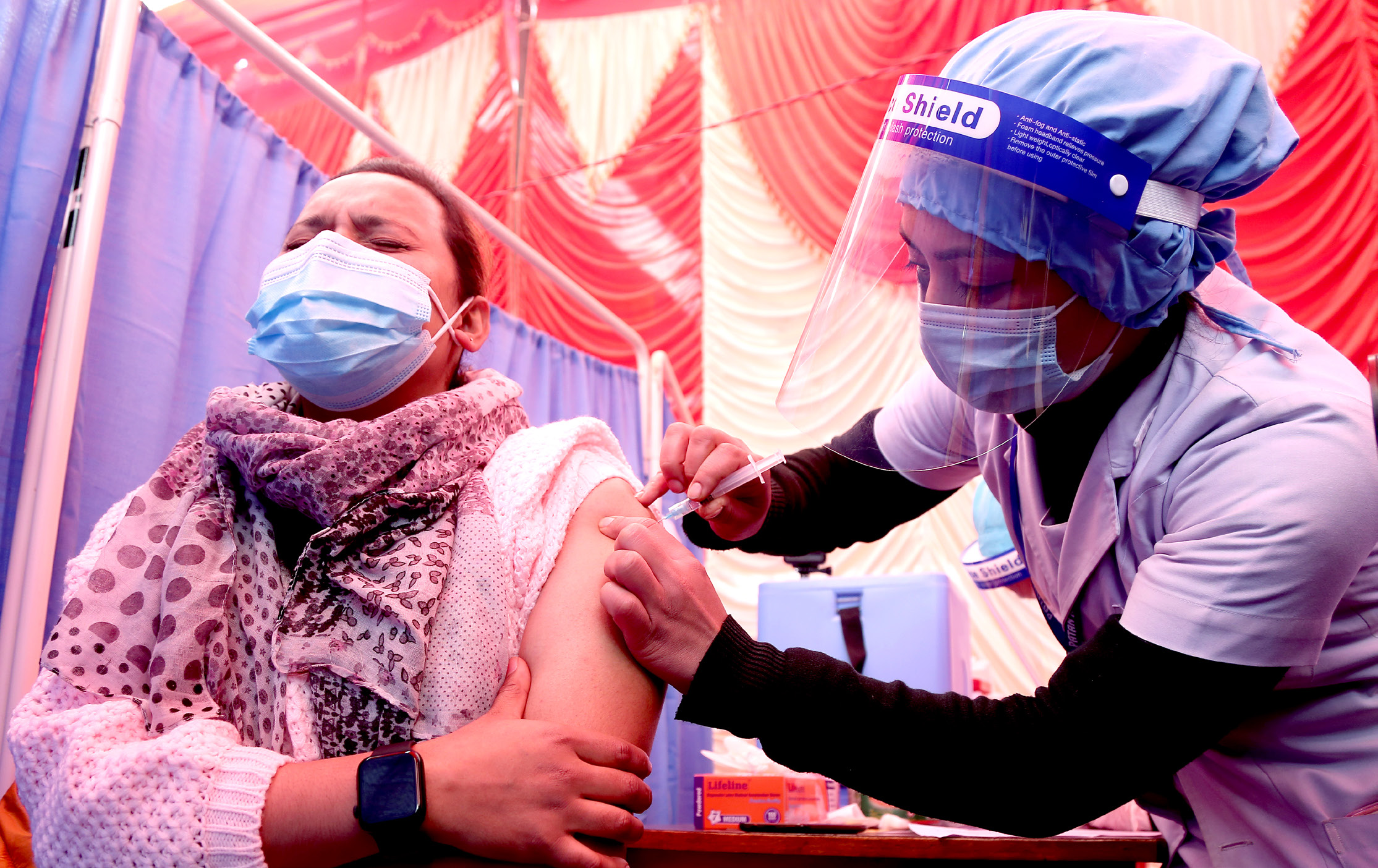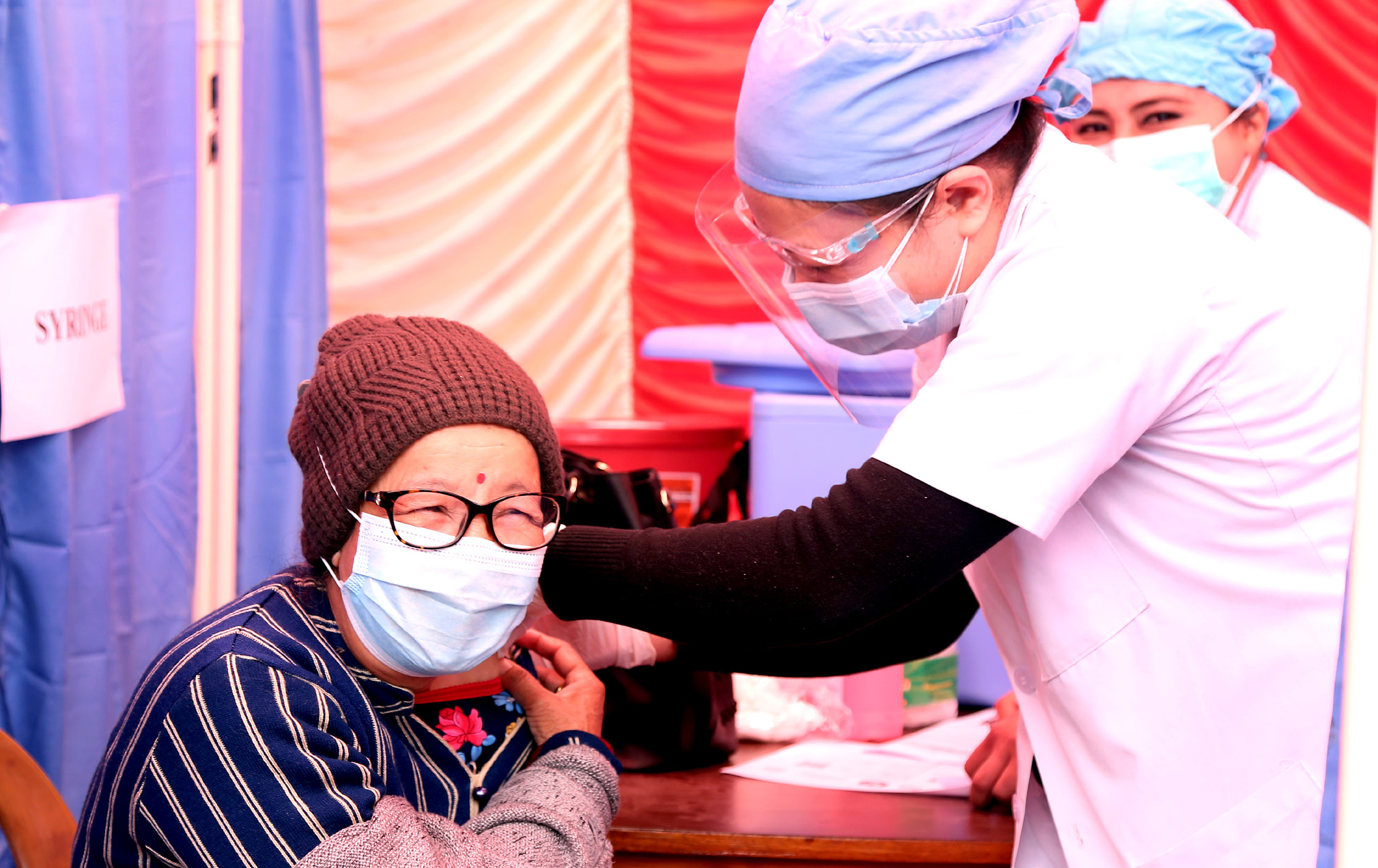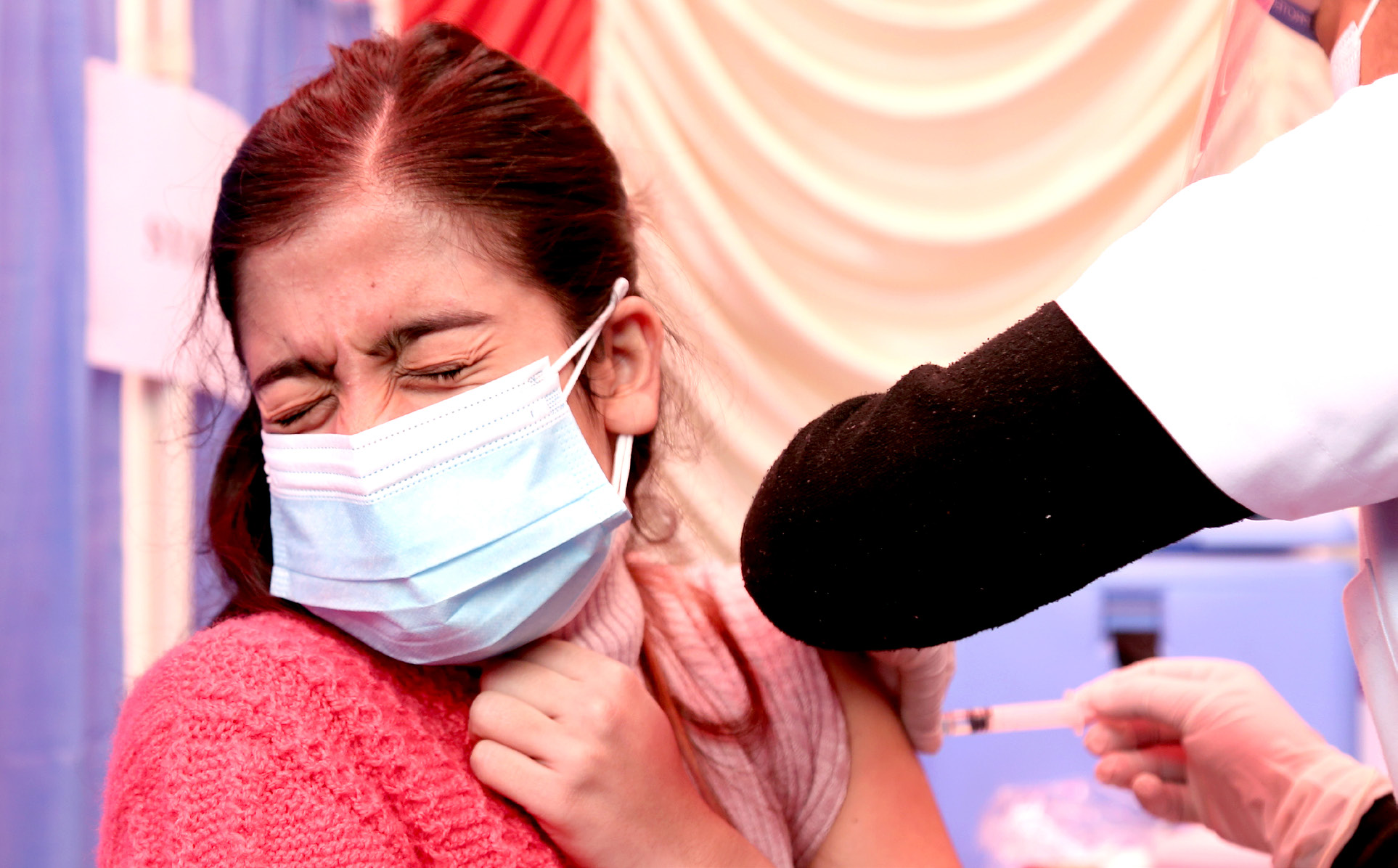The Ministry of Health and Population is all set to begin the second phase of immunization against Covid-19 from 7 March 2021. Those above 55 are the priority this time. But most people belonging to this group seem hesitant. They aren’t sure if the vaccine is safe.
This concern stems largely from what they have seen on social media. Many people who got the vaccine, worldwide, have complained of headaches, fever, and fatigue among other side-effects. Also, the fact that the first phase of the vaccination in Nepal saw a moderate turnout, with only half of the prioritized individuals inoculating themselves, has people questioning its safety, efficacy and need.
Tara Shrestha, 66, housewife and resident of Pulchowk, Lalitpur, says her eldest daughter who’s in London, UK, suffered from fatigue and fever after getting the vaccine. Shrestha wasn’t enthused about getting vaccinated in the first place and now she has made up her mind: She isn’t going to.
“There’s no point of it if it’s going to make me ill. At least I’m okay right now and there’s no imminent danger,” she says.
Safety concerns
The effects of the pandemic-induced infodemic—wherein everybody became an expert and made their ideas public via social media leading to information inundation—has perhaps never been as evident as today, fueling a sense of unease and skepticism. People don’t know what to believe in but the worst of it doesn’t leave their minds.
‘What if the vaccine doesn’t work and makes me sick with Covid-19 instead?’, ‘What if I am allergic to the vaccine?’, ‘Will I have to keep getting new shots every time the virus mutates?’ and, ‘Do we actually need a vaccine as Covid-19 infections are already on the decline?’—These were some of the common concerns among a random sample of 37 people ApEx spoke to on the streets of Lalitpur and Kathmandu.
Saraswati Karki, 47, who runs a grocery store in Gaushala, Kathmandu, isn’t going to let her parents and in-laws, all of whom are over 60, get inoculated. She sees no need for it as she believes the threat has largely passed. She says home remedies like turmeric water and ginger fenugreek paste have protected her family so far. They will continue consuming different herbal concoctions like these to stay safe.
“I wouldn’t have been so opposed to my family getting vaccinated if I was sure it was safe. Everybody I know who has gotten the vaccine has complained of one or the other side-effect,” she says.
Queries answered
However, Sameer Mani Dixit, PhD, a public health expert, says everyone, except those who are severely immunocompromised, should get the vaccine.

No one should be in two minds about it, he says. The Covid-19 vaccine is not at all harmful and poses no threats whatsoever to the human body. What’s important to understand, he says, is that every vaccine will have some side effects and that’s completely normal.
“The idea that you can get Covid-19 from the vaccine is baseless,” says Dixit. What’s true instead, he adds, is that millions of elderly people around the world have been vaccinated against Covid-19 and no one has died or even been gravely ill.
“As far as I know, even fever isn’t a common side effect of the vaccine among the elderly,” he says. This, he explains, is because as you age your immune response becomes low and doesn’t kick in as effectively as it would have when you were younger.
Various reports suggest that mild body ache, chills, and other flu-like symptoms are common and go away in a couple of days. The side effects are a small price to pay for the potential risks you run if you choose not to get jabbed.
Dr Shailendra Kushwaha, consultant cardiologist at Norvic International Hospital, Thapathali, Kathmandu, says the WHO guidelines for the Covid-19 vaccine clearly state that everyone except those under 18 and those suffering from acute phase of fever, cough or other diseases requiring hospitalization are eligible for the vaccine.

Vaccine contraindications
Dr Kushwaha says there are a lot of false beliefs emanating from lack of information dissemination and the resultant unawareness.
And indeed, unavailability of information regarding the vaccine—its importance and contraindications—was cited as a major reason most people didn’t want to get vaccinated. Even those who thought they would eventually have to get it wanted to wait and watch for a while, see how others would react to it.
According to Dr Kushwaha, the vaccine is contraindicated for those who have previously had allergic reactions to vaccines or injectable therapies and other pharmaceutical products. It’s also not recommended for pregnant women and lactating mothers as these groups haven’t been part of any Covid-19 clinical trials so far.
The vaccine is also temporarily not advised for those who have active symptoms of SARS-CoV-2 infection or those who have been given anti-SARS-CoV-2 monoclonal antibodies or convalescent plasma as well as those who are currently unwell and hospitalized.
“For those who have a history of bleeding or coagulation disorder, it’s best they get the vaccine under their physician’s supervision,” says Dr Kushwaha, adding that this is currently what we know for sure about the vaccine based on clinical trials.
“It’s all very new and much of it is being studied. We still don’t know many things about the vaccine and new information will become available as we move forward. But that doesn’t mean we have to be scared of getting vaccinated,” he says.

Both the experts—Dixit and Dr Kushwaha—also stress on the importance of the vaccine for those who have already contracted Covid-19. Dixit says if you have recovered from Covid-19, there’s no reason why you shouldn’t get vaccinated to give your immune system the boost it needs to fight future infections.
Informed decisions
What’s unfortunate is that the Nepal government hasn’t been able to effectively convey just how vital it is that everybody takes the vaccine. Out of the 37 people we talked to, 34 confessed they thought the vaccine was unsafe. They felt the government must have procured low-quality vaccines or made some compromises for commissions.
Sunny Vaidya, 26, who works at Dhukuti, a retail outlet for the Association of Craft Producers, in Kupondole, Lalitpur, says it’s the general sense of mistrust that leads to fear—more so now when our health is at stake.
“Our government is a sham. Everything it does benefits the ones in power and puts the rest at a disadvantage. It’s hard to believe they have the public’s interest in mind while urging us to get vaccinated,” he says.
Vaccines work by mimicking an infectious agent—viruses, bacteria or other microorganisms—that can cause a disease. It trains and prepares our immune system to effectively and quickly respond against it, thus preventing its multiplication that leads to diseases. Getting the Covid-19 vaccine readies your body to fight the virus should you get infected.

According to Dixit, many people also seem to think that being vaccinated means they will not be infected by the virus, which is not true. What happens is that their bodies will fight the virus and not let it multiply, thus effectively killing it, because their bodies have been prepped to recognize it as a threat.
“You might get infected with the virus after you take the vaccine but you won’t suffer from the diseases it could cause,” says Dixit. And given all the potential complications of the novel coronavirus, getting the shot seems to be the safest bet.










